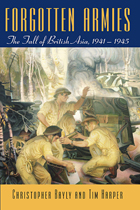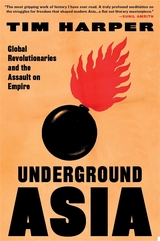
In the early stages of the Second World War, the vast crescent of British-ruled territories stretching from India to Singapore appeared as a massive Allied asset. It provided scores of soldiers and great quantities of raw materials and helped present a seemingly impregnable global defense against the Axis. Yet, within a few weeks in 1941-42, a Japanese invasion had destroyed all this, sweeping suddenly and decisively through south and southeast Asia to the Indian frontier, and provoking the extraordinary revolutionary struggles which would mark the beginning of the end of British dominion in the East and the rise of today's Asian world.
More than a military history, this gripping account of groundbreaking battles and guerrilla campaigns creates a panoramic view of British Asia as it was ravaged by warfare, nationalist insurgency, disease, and famine. It breathes life into the armies of soldiers, civilians, laborers, businessmen, comfort women, doctors, and nurses who confronted the daily brutalities of a combat zone which extended from metropolitan cities to remote jungles, from tropical plantations to the Himalayas. Drawing upon a vast range of Indian, Burmese, Chinese, and Malay as well as British, American, and Japanese voices, the authors make vivid one of the central dramas of the twentieth century: the birth of modern south and southeast Asia and the death of British rule.

In September 1945, after the fall of the atomic bomb--and with it, the Japanese empire--Asia was dominated by the British. Governing a vast crescent of land that stretched from India through Burma and down to Singapore, and with troops occupying the French and Dutch colonies in southern Vietnam and Indonesia, Britain's imperial might had never seemed stronger.
Yet within a few violent years, British power in the region would crumble, and myriad independent nations would struggle into existence. Christopher Bayly and Tim Harper show how World War II never really ended in these ravaged Asian lands but instead continued in bloody civil wars, anti-colonial insurrections, and inter-communal massacres. These years became the most formative in modern Asian history, as Western imperialism vied with nascent nationalist and communist revolutionaries for political control.
Forgotten Wars, a sequel to the authors' acclaimed Forgotten Armies, is a panoramic account of the bitter wars of the end of empire, seen not only through the eyes of the fighters, but also through the personal stories of ordinary people: the poor and bewildered caught up in India's Hindu-Muslim massacres; the peasant farmers ravaged by warfare between British forces and revolutionaries in Malaya; the Burmese minorities devastated by separatist revolt. Throughout, we are given a stunning portrait of societies poised between the hope of independence and the fear of strife. Forgotten Wars vividly brings to life the inescapable conflicts and manifold dramas that shaped today's Asia.

Cundill Prize Finalist
An Economist Best Book of the Year
A Financial Times Best Book of the Year
“Superbly original…Breaks new ground by showing how a collective consciousness emerged among revolutionaries.”
—The Economist
“A clearly written, brilliantly researched examination of the people and movements that shaped Asia’s course in the 20th century and continue to influence the continent today.”
—Walter Russell Mead, Wall Street Journal
“The most gripping work of history I have ever read. It is a truly profound meditation on the struggles for freedom that shaped modern Asia…a flat out literary masterpiece.”
—Sunil Amrith, author of Unruly Waters
European empires had not yet reached their zenith when Asian radicals planted the seeds of their destruction. They gained energy and recruits after the Bolshevik Revolution, which sparked visions of a free and radically equal world. Thanks to cheap printing presses and the new possibility of international travel, these utopian revolutionaries built clandestine webs of resistance from London and Paris to Calcutta, Bombay, Hanoi, and Shanghai. Tim Harper takes us into this shadowy world, following the interconnected lives of Asian Marxists, anarchists, and nationalists such as M. N. Roy, Ho Chi Minh, and Tan Malaka.
Underground Asia shows for the first time how these national liberation movements crucially depended on global action and reveals how these insurgencies shape the region to this day.

An Economist Best Book of the Year
A Financial Times Best Book of the Year
A major historian tells the dramatic and untold story of the shadowy networks of revolutionaries across Asia who laid the foundations in the early twentieth century for the end of European imperialism on their continent.
This is the epic tale of how modern Asia emerged out of conflict between imperial powers and a global network of revolutionaries in the turbulent early decades of the twentieth century.
In 1900, European empires had not yet reached their territorial zenith. But a new generation of Asian radicals had already planted the seeds of their destruction. They gained new energy and recruits after the First World War and especially the Bolshevik Revolution, which sparked utopian visions of a free and communist world order led by the peoples of Asia. Aided by the new technologies of cheap printing presses and international travel, they built clandestine webs of resistance from imperial capitals to the front lines of insurgency that stretched from Calcutta and Bombay to Batavia, Hanoi, and Shanghai. Tim Harper takes us into the heart of this shadowy world by following the interconnected lives of the most remarkable of these Marxists, anarchists, and nationalists, including the Bengali radical M. N. Roy, the iconic Vietnamese leader Ho Chi Minh, and the enigmatic Indonesian communist Tan Malaka. He recreates the extraordinary milieu of stowaways, false identities, secret codes, cheap firearms, and conspiracies in which they worked. He shows how they fought with subterfuge, violence, and persuasion, all the while struggling to stay one step ahead of imperial authorities.
Underground Asia shows for the first time how Asia’s national liberation movements crucially depended on global action. And it reveals how the consequences of the revolutionaries’ struggle, for better or worse, shape Asia’s destiny to this day.
Previous praise for Tim Harper
Praise for Forgotten Wars:
“[A] compelling book.”—Philip Delves Broughton, Wall Street Journal
“Lucid…majestic.”—Peter Preston, The Observer
“Authoritative.”—Pankaj Mishra, New Yorker
Praise for Forgotten Armies:
“Panoramic… Vivid.”—Benjamin Schwarz, New York Times Book Review
“A spectacular book.”—Martin Jacques, The Guardian
READERS
Browse our collection.
PUBLISHERS
See BiblioVault's publisher services.
STUDENT SERVICES
Files for college accessibility offices.
UChicago Accessibility Resources
home | accessibility | search | about | contact us
BiblioVault ® 2001 - 2024
The University of Chicago Press









